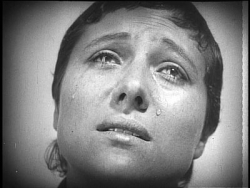P2
Anyone who’s a fan of Seinfeld knows the “Parking Garage” episode in which George, Jerry, Elaine, and Kramer spend the entire show wandering a parking garage looking for their lost car, while encountering unsympathetic strangers and a heartless security guard. More than any other episode, “The Parking Garage” perfectly embodies the absurd humor and peripatetic sense of postmodern alienation of this “show about nothing.” I can’t prove it, but I’ll wager that the writers of P2, Alexandre Aja and Grégory Levasseur, love that episode as well, and not just because P2 has the same setting. P2 also has a subversive sense of humor, largely due to the terrific performance of Wes Bentley as the psychotic parking attendant Thomas. He’s all the more terrifying because he loves Elvis (and does a pretty decent impersonation) and insists that he’s basically a good guy. Toward the end of the film, as his victim turns the tables on him, he sincerely complains that “you’re trying to get me fired!” This isn’t to say that P2 isn’t horrifying. Thomas is all the more unsettling because of his delusions, and he does a good job of traumatizing Angela, the unfortunate woman he’s been stalking and who’s trapped in his parking garage. She’s rendered barefoot, bare-chested, and bloodied, but she survives the ordeal and emerges from it with perhaps a new sense of strength and determination, all of which is symbolized at the end of the film by the way she hobbles her way out of the garage’s darkened tunnel toward the warm, bright light of the outside world. If all of this is a bit formulaic—and it certainly is—then it’s forgivable because it’s executed so perfectly well. As Rolling Stone critic Peter Travers is fond of saying, “if you don’t know where this movie will go, then you’ve never seen a movie.” Even so, P2 is thoroughly enjoyable from beginning to end.
Martyrs
If you’re reading this blog, then there’s a pretty good chance that you’ve seen Martyrs and that you have strong opinions about it. It’s one of those rare films that has galvanized the horror community into camps. However, I think the one thing that’s beyond dispute is that this is NOT a formulaic film. What begins as a straightforward (and really terrific) torture/revenge story about the psychology of survival transforms into something else entirely. The film’s odd trajectory might not work for everyone, but I think it’s an interesting attempt to take “torture porn” into new terrain, or to underscore one of the underlying themes of the genre. Martyrs is an attempt to illustrate that something horrifying, grotesque, and also strangely sublime happens when we’re traumatized beyond our breaking point. As Hunter S. Thompson put it (and as Warren Zevon sang it), “you’re a whole different person when you’re scared.” Ironically, in exploring this new terrain, director Pascal Laugier borrows extensively from the theme and iconography of Carl Dreyer’s landmark 1928 film La Passion de Jeanne d’Arc. In order to more faithfully narrate the trial and execution of the famous French martyr, Dreyer developed new camera techniques to meticulously document the nuanced suffering and spiritual transformation as expressed by the actor’s face. Dreyer’s film is a haunting, fearless, and brilliant study of the politics and psychology of human suffering and spiritual transformation. Even though Martyrs never flinches from its treatment of pain and torment, it doesn’t quite capture Dreyer’s esoteric sense of his subject matter because Laugier reduces his version to something far more brazen and glib. Still, to his credit, Laugier proves that contemporary torture porn, especially of the French variety, has a very austere and established pedigree.














One Response to P2 and Martyrs
Subscribe Without Commenting